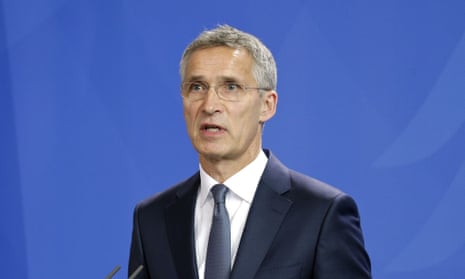The head of Nato has warned that the deep divisions between the US under Donald Trump and its European allies are not going away and there is no certainty that the transatlantic relationship and its military alliance will survive.
Against a backdrop of Trump’s open baiting of the German chancellor, Angela Merkel, over immigration and her domestic difficulties, Jens Stoltenberg has called for all Nato members to work to avoid a disastrous breakdown in western unity.
Writing in the Guardian, Nato’s secretary general admits that “political storm clouds” are putting a strain on the ties that bind the Nato allies. But, in an appeal to leaders before the military alliance’s summit in July, the former prime minister of Norway says that “where differences persist, we must limit any negative impact on our security cooperation”.
Stoltenberg – who is meeting Theresa May in Downing Street on Thursday as he prepares for the summit in Brussels – writes: “Since the alliance was created almost 70 years ago, the people of Europe and North America have enjoyed an unprecedented period of peace and prosperity. But, at the political level, the ties which bind us are under strain.
“There are real differences between the United States and other allies over issues such as trade, climate change and the Iran nuclear agreement.
“These disagreements are real and they won’t disappear overnight. In fact, nowhere is it written in stone that the transatlantic bond will always thrive. That doesn’t, however, mean that its breakdown is inevitable. We can maintain it, and all the mutual benefits we derive from it.”
Stoltenberg’s intervention comes at a point of extreme tension among the leadership of the western powers.
In seeking to defend his administration’s policy of separating children from their parents at the country’s border, Trump launched an extraordinary attack on Merkel and the EU on Tuesday, likening Europe to a “migrant camp” while claiming that “the people of Germany are turning against their leadership as migration is rocking the already tenuous Berlin coalition”.
Merkel is embroiled in a tense standoff with her interior minister over immigration. She faces a two-week deadline to find a European solution or risk the collapse of her governing coalition.
Trump has already caused a fracture in relations with traditional US allies by reneging on his country’s commitments in both the Paris climate change agreement and the nuclear deal with Iran.
He is also threatening a transatlantic trade war with the EU, and has criticised Germany and others for not spending enough on defence and freeloading off the US.
Of the 29 Nato members, only eight, including the US and the UK, spend more than 2% of their GDP on defence, a threshold that the alliance agreed should be met by all the countries by 2024. Germany spent €37bn (£32.5bn), or 1.2% of GDP, on defence last year.
Asked for his position last month on those countries underspending, Trump warned: “They’ll be dealt with.”
Greater “burden sharing” is set to be a theme of the Nato summit in Brussels, along with Stoltenberg’s desire to improve the readiness of Nato forces to deploy in quick order, and to build on the alliance’s counter-terrorism efforts, including through the training of the Iraqi military and an extension of financing for Afghan forces until 2024.
However, as with the last summit, it is likely that it will be Trump’s determination to highlight the heavy burden on the US taxpayer that will dominate.
Stoltenberg praises the US under Trump for its renewed commitment to Nato, an organisation that the US president once described as obsolete. But he points out that cuts in defence spending among the Nato allies have been reversed across the board. An extra $18bn (£13.6bn) has been spent by non-US Nato allies on military equipment alone since 2014.
Stoltenberg writes: “The United States and Canada are stepping up their commitment to Europe’s security. In fact, since coming to office, the Trump administration has increased funding for the US presence in Europe by 40%. The last US battle tank left Europe in 2013 but now they’re back in the form of a whole new US armoured brigade.
“This isn’t a one-way street. European allies, with the UK in the vanguard, are stepping up too – spending billions more on defence and taking responsibility for Euro-Atlantic security alongside their North American allies.”
Stoltenberg, who will meet the British foreign secretary, Boris Johnson, and the defence secretary, Gavin Williamson, on Wednesday before meeting the prime minister and giving a speech at Lancaster House on Thursday, says the US and its allies need to raise their heads from the current divisions and recognise the need for unity at a dangerous point in world history.
He writes: “It is – and has always been – in our fundamental interest to stand together on defence. And that is as true now as ever. Because we face the most unpredictable security environment in a generation: international terrorism, the proliferation of weapons of mass destruction, cyber-attacks – and, of course, a Russia which has used force against its neighbours, which tries to meddle in our domestic affairs, and which seems to have no qualms about using military-grade nerve agents on our streets.
“Our achievements side-by-side are unprecedented. So as long as we stand together, even if the road does indeed get rough, it will always lead in the right direction: peace and security for our nations and our nearly 1 billion citizens.”
